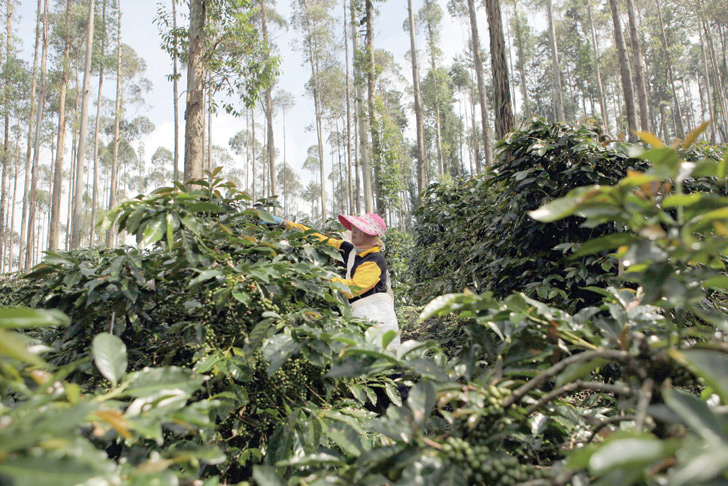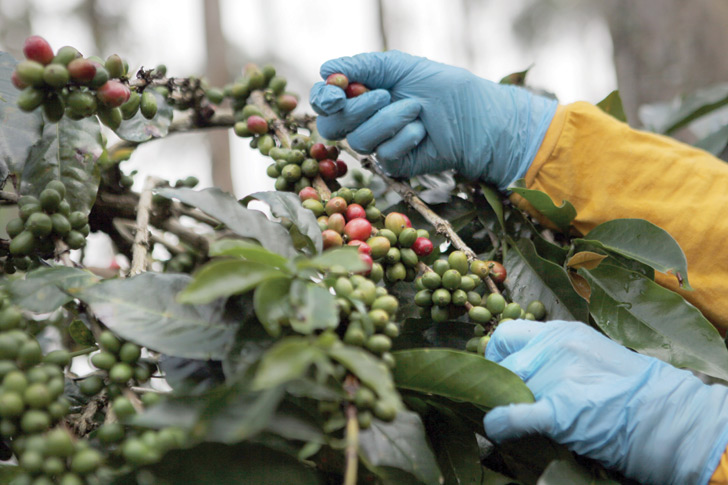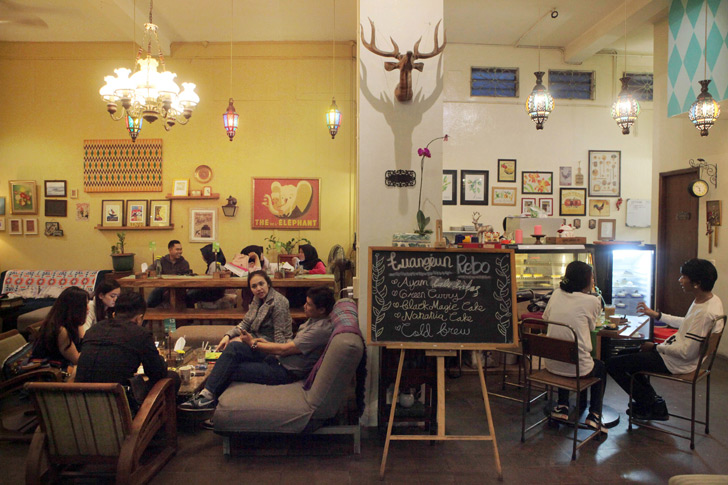
Indonesia has a dream. The archipelagic nation of some 17,000 islands is taking steps to ensure its coffee continues its upwards trajectory to become “the beverage of the 21st century”, according to its trade minister, Thomas Lembong. On the nation’s tropical mountainsides, farmers are working to make that vision a sustainable reality.
Coffee is already performing well in the country, with exports worth $1.19 billion in 2015, up 15% on the previous year. Also, in a coup for the industry’s image overseas, a special focus was placed on Indonesia at the Specialty Coffee Association of America (SCAA) Expo held in the US in April. At the opening ceremony, Lembong noted how coffee powers ideas – fuelling creative minds from Jakarta to Silicon Valley.
“The coffee you enjoy from Indonesia supports millions of our farmers,” he said. “Beyond being a livelihood, it’s a way of life.”
However, around the same time as the expo, non-profit group Conservation International released a study that found climate change could seriously disrupt the world’s coffee supply by 2050. The report, titled Coffee in the Twenty First Century, found that to meet the world’s growing thirst for coffee, global production must grow by as much as three times by 2050. This could lead to significant deforestation, with modelling showing that 60% of the area that will be suitable for coffee growing in 2050 is currently tropical forest.
Coffee in the 21st century
Lembong’s lofty talk of Indonesian coffee as “the beverage of the 21st century” will require much ingenuity in a changing climate.

Right now, Indonesia excels at growing specialty coffees, which are generally arabica beans used for espresso and other café drinks. Arabica is traditionally grown in shade and at higher elevation than robusta, a cheaper, less-popular species grown in the sun at lower elevation.
At the SCAA Expo, the 17 Indonesian coffees on show all scored 83.5 and above out of a possible 100 in ‘cupping’ tests, a standard industry practice by certified graders. Industry experts, who use language akin to that used for wine, raved that this was coffee “like no other”, praising its wild floral and fruity notes.
One product that wowed the expo was from West Java’s Mount Malabar, a forested slope kept cool by a heavy blanket of mist. In the late 1990s, when Indonesia was in the grip of the Asian financial crisis, more people resorted to vegetable growing to make ends meet, and parts of the mountain’s previously protected forest were cleared for farming, creating erosion and pollution downstream.
“Ecology, not economy”
Coffee grower Supriatnadinuri, known as Nuri, hails from Pasir Mulya, the village below the mountain. In 2002, he and others planted coffee on the degraded hillside to stop erosion, as well as a range of local tree species to shade the coffee. The motivation, he says, was “ecology, not economy”.
“The trees had been logged, and within years the land was abandoned again,” Nuri recalls. “If there was rain, the village flooded. If it was hot, the village was dry and dusty.”
A walk up the mountain today reveals a rich ecosystem where, among the coffee and native trees grown to shade it, an array of insects, reptiles and whistling birds live. A flourishing forest was their goal, but these growers achieved much more.
In less than a decade, the limited-quantity harvests from Mount Malabar became an in-demand product, winning praise from abroad for its bold, fruity taste.
The Conservation International report predicts that climate change will hurt arabica crops such as these, which are less adaptable to warmer conditions. Growers could replant with robusta, or migrate to higher areas, potentially deforesting remnant mountain environments.
Yet Nuri says he would not be tempted to clear forest further up the mountain to push out greater quantities, repeating his mantra of “ecology, not economy”.
Back in 2006, respected West Java coffee buyer Nathanael Charis approached Nuri and others, offering to share his knowledge of organic growing and better processing. Efforts stepped up in 2008, with government-backed grower workshops, and in 2009, the coffee met the standards of prominent Australian buyer Toby’s Estate.
“[The Mount Malabar farmers’] results are getting better and better…” Nathanael says. “We’ve seen the benefits for the environment and also for the climate.”
Now, lessons from West Java are in demand in other regions, and Nuri has helped communities in Sulawesi and Lombok achieve better yields and higher incomes.

The village of Sembalun, Lombok, sits high in a pocket surrounded by mountains including Mount Rinjani, Indonesia’s second-highest peak. Most of its coffee plants were removed in the 1980s in favour of garlic, and what coffee remained was of poor quality – 1kg of beans could be bartered for just two small salted fish.
Three years ago, a local farmer named MS Wathan and some of his peers formed a collective called Sankabira, with the goal of bringing new prosperity to the community by reviving cultural wisdom and old traditions. One of those was coffee growing and, in 2014, Nuri visited to share his knowledge of organic growing and his environment-first ethic.
It was a breakthrough for Sankabira and the arabica coffee they named Pahlawan, which means “heroes” in Bahasa Indonesia.
“We called the coffee ‘Pahlawan’ because no one else can change your life but you. In this case we are farmers, and only we, the farmers, could change our lives,” says Wathan.
The replanting of so many coffee trees has stopped landslides in Sembalun, Wathan says, while their chocolatey, medium-bodied coffee is improving with every harvest and impressing coffee connoisseurs.
Turning profit into progress
Profits from the higher yields they’ve been able to achieve with Nuri’s help have funded construction of a learning room, which villagers of any age can attend. In one corner, pre-schoolers might be reading while, in another, their mothers learn how to make handicrafts for additional income.
Wathan totally agrees with the conservation approach. “The most important thing here is we are replanting trees, the lungs of the Earth,” he says. “Nuri’s visit was very motivating for us. After he came, the quality of our coffee was much, much better. Before, the quality was poor because we didn’t know how to take care of it.”
Conservation International, too, assists growers throughout Sumatra, who are already grappling with unpredictable weather and pest outbreaks. In partnership with government agencies, its assistance focuses on improved shade systems, forest and freshwater conservation.
The group’s spokesman Chase Martin says productivity gains can be achieved with a “produce and protect” approach. This means identifying land where intensification would have low impacts on forests, water and other natural resources, and working there to increase productivity and conserve nearby forest.
“Many studies have shown that training on improved production practices – whether they be shade or sun systems – results in productivity improvements,” Martin says.
New plant varieties that can cope with harsher conditions could also prevent growing migrating to landscapes with conditions similar to today’s production areas.
Of course, it’s not just growers who need to reflect on their habits. Coffee drinkers, too, have a significant part to play.
In his Bandung-based chain of Morning Glory cafés, Charis offers free cupping and education to customers as part of the café experience. Their coffee packaging features the story and photo of a farmer at the place of origin, connecting consumer with grower. Charis believes it is a long road to a more conscious coffee culture, but what can be achieved in the meantime is improved grower welfare.
“It’s not where coffee comes from that’s really important,” he says. “It’s how much the farmers are getting paid.”
The definition of ‘coffee lover’ is being rewritten for the 21st century. It is no longer the person with the five-cup-a-day habit, but the one who has made a choice to support the prosperity of the grower and their natural resources.


